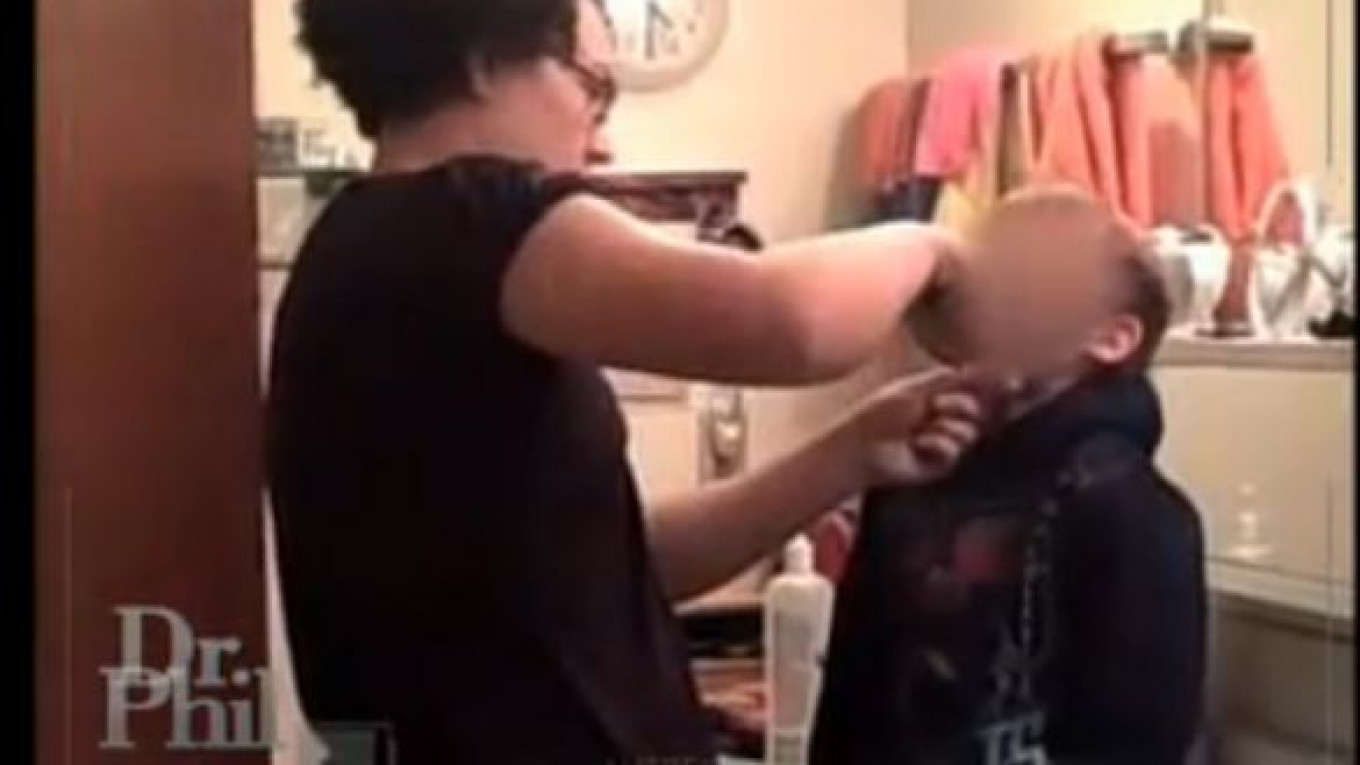ANCHORAGE, Alaska — An Alaska woman convicted of punishing her adopted Russian son by squirting hot sauce into his mouth was spared immediate jail time on Monday.
Thirty-six-year-old Jessica Beagley was given three years of probation, a 180-day suspended jail sentence and a $2,500 fine — also suspended — after she was convicted last week of misdemeanor child abuse. Prosecutors said she used a videotape of herself punishing the 7-year-old boy as a ploy to get on the "Dr. Phil" TV show.
Beagley submitted the eight-minute tape for a show segment titled "Mommy Confessions." She said the boy had lied about getting into trouble at school.
After squirting hot sauce in the boy's mouth for lying, she also punished him with a cold shower.
Prosecutor Cynthia Franklin rejected the contention that Beagley was trying to get help for her son through the television show. She said Beagley was experienced at setting up counseling sessions. The punishment of the child on tape, she said, was a gratuitous act aimed at getting herself on television.
"Jessica Beagley did not have to make this video and did not have to do this to her son," Franklin said.
Franklin recommended a sentence of 360 days and a requirement for Beagley to serve 30 days behind bars as a deterrent to other parents.
With her husband, an Anchorage police officer, at her side, Beagley said it was her most important job to love and nurture her children, and that being a good mother to her meant teaching children right from wrong.
"I would ask that the court would allow me to be that mother that I would like to be, to not disrupt the lives of my children any more than has been already," she said.
Noting the seriousness of the offense, District Court Judge David Wallace rejected a request by Beagley's attorney for a suspended imposition of sentence, which could have allowed Beagley to have her conviction erased.
"It was a premeditated, gratuitous act," he said.
But he declined to assess jail time or a fine, noting that the family likely would need money for future counseling sessions. Beagley had faced a maximum sentence of one year in jail and a $10,000 fine.
Beagley and her husband adopted the boy and his twin brother in 2008. The boys were 5 years old at the time and had spent three years in an orphanage.
Before that, their family had lived in a shack, and the twins slept on shelves in an armoire. One twin adjusted to his new home in Alaska, but the other exhibited behavioral problems that included lying and urinating on the floor.
Beagley's attorney said his client turned to unconventional forms of punishment when spankings, time-outs and restricting television were ineffective in changing the boy's behavior.
Defense attorney William Ingaldson contended that Beagley had reached out to the "Dr. Phil" show for help. The incident that sparked the videotaped punishment occurred at school.
The boy got in trouble for sword-fighting with pencils, and, his mother said, lying about it. Beagley recorded the punishment on Oct. 21, 2010.
During the trial, Franklin told the jury that it wasn't Beagley's first attempt. After seeing a segment in April 2009 titled "Angry Moms," she contacted the show but heard nothing for a year and a half, Franklin said.
The show eventually called to find out if Beagley was still angry, she said. Beagley submitted audition videos in which she yelled at the boy, but producers said they needed to see her actually punishing her son, the prosecutor said.
That's when Beagley got the video camera ready, made sure there was enough hot sauce on the shelf in the bathroom, and recruited her 10-year-old daughter to shoot the video, Franklin said.
Days later, Beagley was headed to Los Angeles to tape the show that first aired Nov. 17. The episode sparked public outrage in Russia, with some people demanding that the boy and his twin brother be returned to their native country.
A Message from The Moscow Times:
Dear readers,
We are facing unprecedented challenges. Russia's Prosecutor General's Office has designated The Moscow Times as an "undesirable" organization, criminalizing our work and putting our staff at risk of prosecution. This follows our earlier unjust labeling as a "foreign agent."
These actions are direct attempts to silence independent journalism in Russia. The authorities claim our work "discredits the decisions of the Russian leadership." We see things differently: we strive to provide accurate, unbiased reporting on Russia.
We, the journalists of The Moscow Times, refuse to be silenced. But to continue our work, we need your help.
Your support, no matter how small, makes a world of difference. If you can, please support us monthly starting from just $2. It's quick to set up, and every contribution makes a significant impact.
By supporting The Moscow Times, you're defending open, independent journalism in the face of repression. Thank you for standing with us.
Remind me later.





